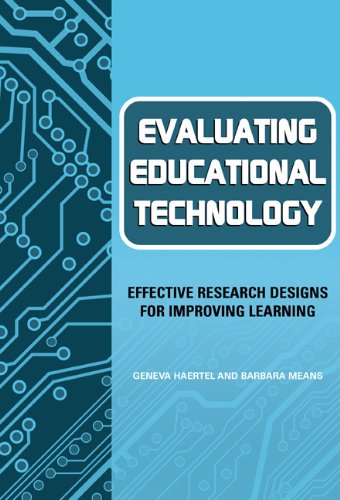

Most ebook files are in PDF format, so you can easily read them using various software such as Foxit Reader or directly on the Google Chrome browser.
Some ebook files are released by publishers in other formats such as .awz, .mobi, .epub, .fb2, etc. You may need to install specific software to read these formats on mobile/PC, such as Calibre.
Please read the tutorial at this link: https://ebookbell.com/faq
We offer FREE conversion to the popular formats you request; however, this may take some time. Therefore, right after payment, please email us, and we will try to provide the service as quickly as possible.
For some exceptional file formats or broken links (if any), please refrain from opening any disputes. Instead, email us first, and we will try to assist within a maximum of 6 hours.
EbookBell Team

4.3
18 reviews
ISBN 10: 0807743305
ISBN 13: 9780807743300
Author: Geneva Haertel, Barbara Means
In this definitive volume, today’s leading authorities outline research designs, methodologies, and types of assessments that can be used to more effectively evaluate educational technologies. These designs, when properly implemented, provide critical evidence of technology’s impact on student learning. Featuring real-world examples with lessons learned to help readers understand the experts’ conclusions and recommendations, this user-friendly reference is organized around four themes:
The range of alternative research designs that can be used to document whether a particular technology is effective and warranted.
The use of contextualized evaluations sensitive to local conditions and concerns.
The need for longitudinal research designs to detect both long- and short-term effects of technology.
The need for new kinds of assessments to measure student learning.
In addition to this comprehensive reference, TC Press also publishes a companion volume that synthesizes these research finding—Using Technology Evaluation to Enhance Student Learning. This companion volume will help educators make sense of claims regarding the scientific research base for technologies they are considering using in their classrooms and schools, and will show policymakers how to find out “what works” in their district or state. Used together, this groundbreaking resource is the only reference you will need for the most up-to-date, authoritative information on how to evaluate the effectiveness of educational technology.
“I am confident that this collection of papers and new thinking on the design of rigorous evaluations of technology and learning, and the assessments that can best document their effects will make important contributions to the field.”
—From the Foreword by Linda G. Roberts, Former Director of the U.S. Department of Education, Office of Educational Technology
“After a decade of massive spending on e-learning technologies and infrastructure, we should all be thankful for this unique volume, which provides an invaluable resource for policymakers, researchers, and practitioners.”
—Roy Pea, Director, Stanford Center for Innovations in Learning, Stanford University
“An invaluable resource for scholars, policymakers, and practitioners. Applying the evaluative models in this volume can elucidate the ‘conditions for success’ under which computers and telecommunications provide dramatic benefits in student learning outcomes.”
—Chris Dede, Graduate School of Education, Harvard University
the realities of evaluating educational technology in school settings
evaluating educational technology ppt
evaluating educational technology and integration strategies
evaluating the evidence for educational technology
evaluating the impact of educational technology
Tags: Geneva Haertel, Barbara Means, Evaluating, Technology